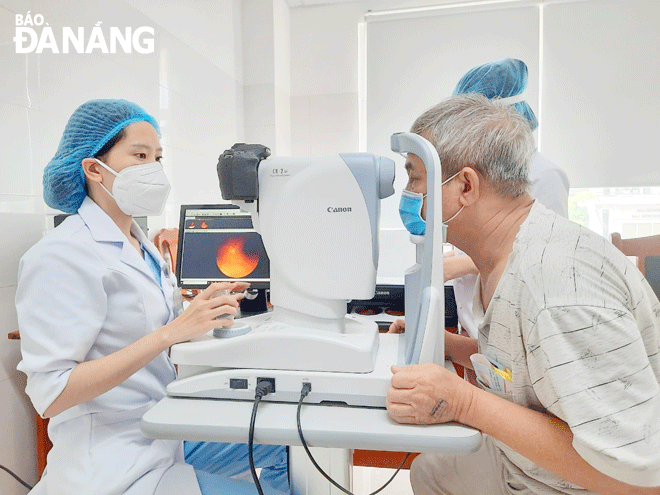Health insurance: 'Lifebuoy' for poor patients
At the end of 2021, in the corridor of the Department of Surgery - Plastic Surgery of the Da Nang Hospital, Mr. Huynh Quang Dieu, 65, hailing from the central province of Quang Ngai was sad as he had to pay a hospital fee of VND120 million for the treatment for his son who had not participated in health insurance for many years due to financial difficulties.
 |
| Participating in health insurance helps people confidently access health care services. (Photo taken at Da Nang General Hospital by H.L) |
Huynh Nhat Cong Khanh, Dieu's son, suddenly had a traffic accident and was rushed to Quang Ngai Provincial General Hospital for emergency treatment, but due to his severe injuries, Khanh was immediately transferred to the Da Nang General Hospital. At that time, the poverty-stricken man was depressed and worried as he brought with him a few hundred thousand VND.
Having undergone medical checks, Khanh was diagnosed with a head injury, blood loss, a broken right leg, and the damaged skin showing strong signs of necrosis. If not quickly treated, Khanh's right leg was highly likely to be amputated.
Khanh was a self-employed worker with unstable income, subject to voluntary health insurance premiums in the form of households. However, his family didnot join health insurance for a long time because they were confident about their good health.
Doctor Nguyen Quoc Viet, the Deputy Head of the Department of Burn Surgery - Plastic Surgery of the Da Nang General Hospital recalled, patient Khanh at that time was in a need of urgent treatment for external fixation, anastomosis, the handling of necrotic skin, skin grafting and other related health problems.
Without health insurance, the patient's family had to borrow money from friends and relatives. Faced with this situation, the doctors of the Burn Surgery - Plastic Surgery Department gave the priority to saving the patient first, and at the same time urged the Social Work Department to raise more than VND80 million from sponsors for Khanh.
Previously, a patient from Duy Xuyen District, Quang Nam Province, treated at the Intensive Care Unit of the Da Nang General Hospital, had to pay more than VND300 million worth of hospital fees because he did not have health insurance.
Meanwhile, if he had held a health insurance card, he would have paid only more than VND60 million.
Mai Thi Thu Thao, working at the Social Work Department of the Da Nang General Hospital, said that health insurance helps many patients in difficult circumstances reduce a burden of high hospital fees.
For seriously ill patients with long-term treatment, the absence of health insurance will push them into a more difficult situation, even being put of treatment due to failure to timely pay hospital fees.
In a supportive move, Thao’s unit always collects donations from philanthropists for the poor patients in parallel with raise their awareness of the significance of health insurance if an accident happens.
From 2016, in addition to the subjects participating in compulsory health insurance, people eligible to buy voluntary health insurance will participate in paying insurance in the form of households.
For the time being, the health insurance premium rates applicable to the persons as follows: The first person shall pay 4.5% of base salary; the second, third and fourth persons, 70%, 60% and 50%, respectively, of the rate applicable to the first person; and the fifth person and others, 40% of the rate applicable to the first person.
This reduction of health insurance premium rates is applied when all family members buy health insurance in the same fiscal year.
Health insurance is a humane policy to help people confidently access health care services. Da Nang is strive to raise universal health insurance coverage in the by to 995 by 2025.
Currently, the Vietnamese Ministry of Health is collecting opinions on a draft amendment to the Law on Health Insurance, proposing to increase the health insurance premium rate to 6% of the base salary for employees at units and enterprises.
For the household health insurance package, the draft proposes that the first person pay 6% of the base salary, the second person and others pays 80% of the rate applicable to the first person, instead of 70%, 60%, 50% as currently.
In return, health insurance will pay for a number of additional services such as rehabilitation support, prenatal and postnatal screening, early screening for chronic diseases, disease prevention and home treatment for the elderly and those with severe disabilities.
Reporting by HUYNH LE - Translating by A.THU